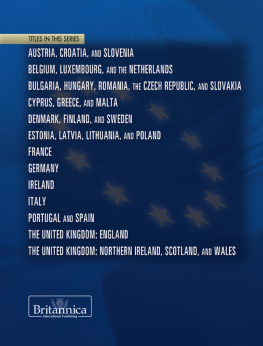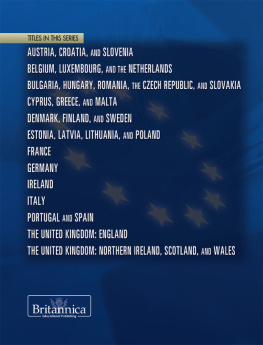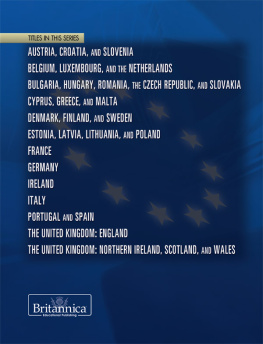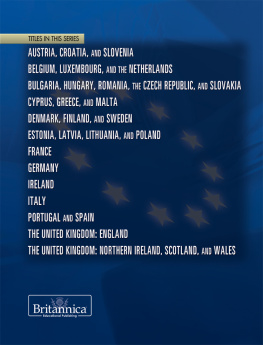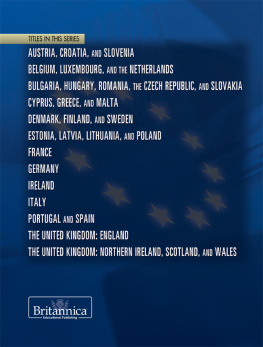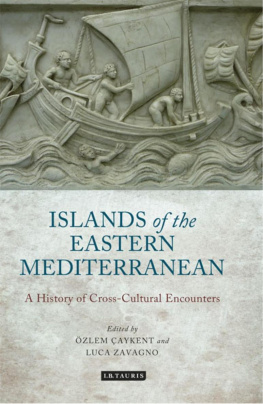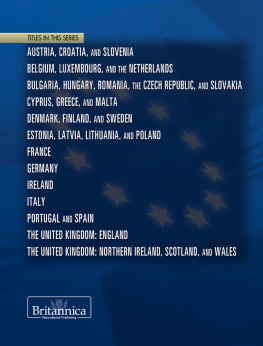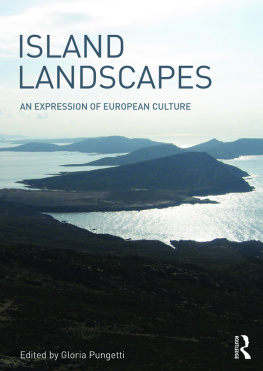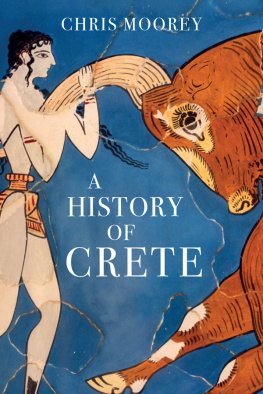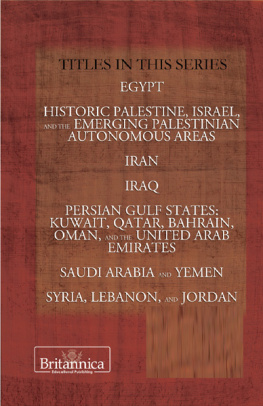

Published in 2014 by Britannica Educational Publishing
(a trademark of Encyclopdia Britannica, Inc.)
in association with Rosen Educational Services, LLC
29 East 21st Street, New York, NY 10010.
Copyright 2014 Encyclopdia Britannica, Inc. Britannica, Encyclopdia Britannica,
and the Thistle logo are registered trademarks of Encyclopdia Britannica, Inc. All
rights reserved.
Rosen Educational Services materials copyright 2014 Rosen Educational Services, LLC.
All rights reserved.
Distributed exclusively by Rosen Educational Services.
For a listing of additional Britannica Educational Publishing titles, call toll free (800) 237-9932.
First Edition
Britannica Educational Publishing
J.E. Luebering: Director, Core Reference Group
Adam Augustyn: Assistant Manager, Core Reference Group
Marilyn L. Barton: Senior Coordinator, Production Control
Steven Bosco: Director, Editorial Technologies
Lisa S. Braucher: Senior Producer and Data Editor
Yvette Charboneau: Senior Copy Editor
Kathy Nakamura: Manager, Media Acquisition
Edited by: Noah Tesch, Assistant Editor, Geography
Rosen Educational Services
Jeanne Nagle: Senior Editor
Nelson S: Art Director
Cindy Reiman: Photography Manager
Brian Garvey: Designer, Cover Design
Introduction by Richard Barrington
Library of Congress Cataloging-in-Publication Data
Tesch, Noah.
Cyprus, Greece, and Malta/edited by Noah Tesch. 1st ed.
p. cm. (The Britannica guide to countries of the European Union)
In association with Britannica Educational Publishing, Rosen Educational Services.
Includes bibliographic references and index.
ISBN 978-1-61530-985-6 (eBook)
1. European UnionCyprusJuvenile literature. 2. European UnionGreeceJuvenile
literature. 3. European UnionMaltaJuvenile literature. 4. Cyprus--Juvenile literature. 5.
GreeceJuvenile literature. 6. MaltaJuvenile literature. I. Tesch, Noah. II. Title.
DS54.A3 C977 2014
956.93dc23
On the cover: View of the Greek Parliament on Syntagma Square, in Athens. iStockphoto.com/Arpad Benedek
Cover, p. iii (map contour and stars), back cover, multiple interior pages (stars) iStock-photo.com/pop_jop; cover, multiple interior pages (background graphic) Mina De La O/Digital Vision/Getty Images
CONTENTS
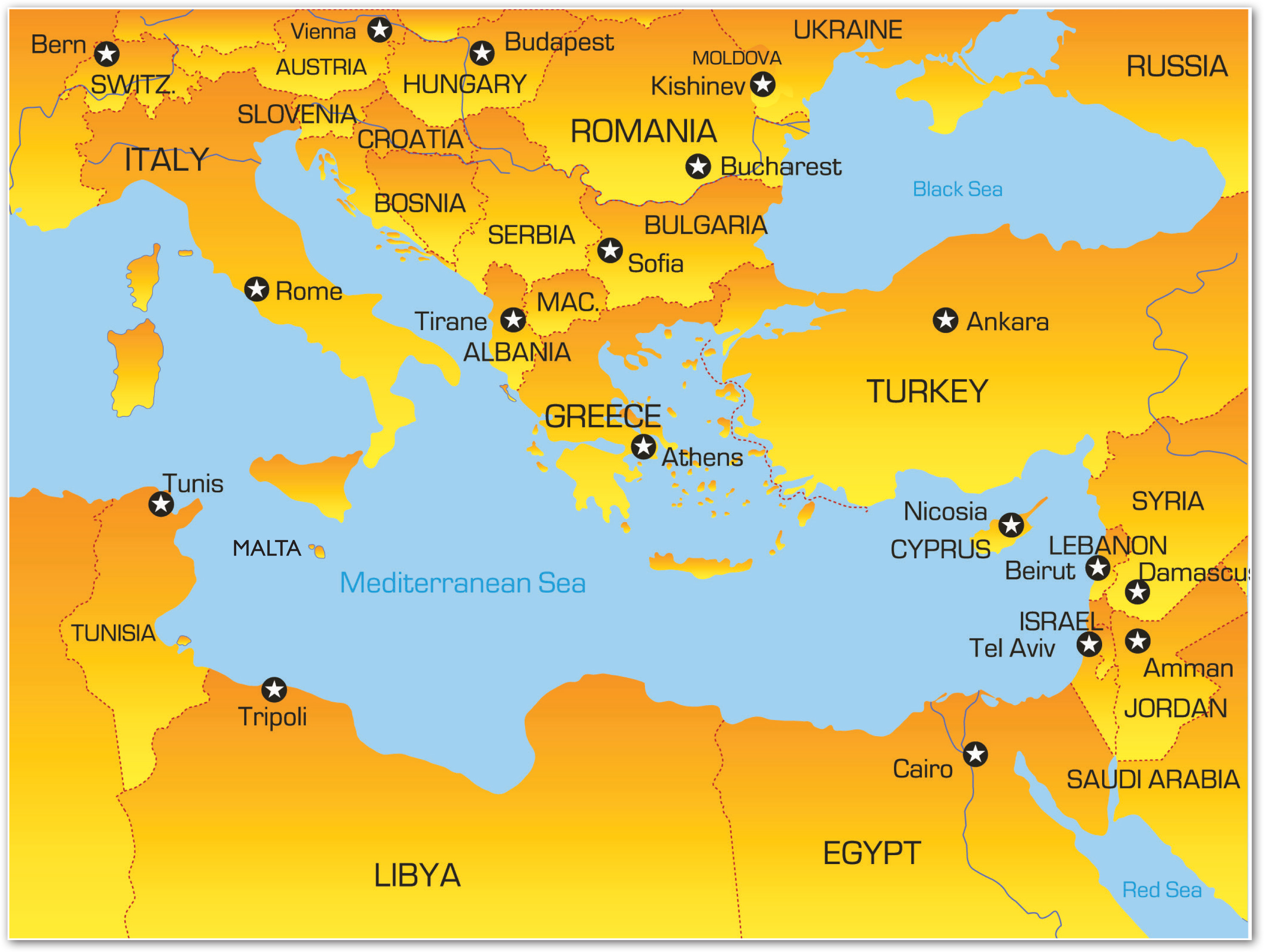
Map of the Mediterranean, featuring Cyprus, Greece, and Malta. Olinchuk/Shutterstock.com.
S ince ancient times, Greece has been central to the story of mankind. European civilization has been shaped almost immeasurably by the philosophical, political, and artistic works of the societies that flourished in the area of the Aegean Sea beginning in the 2nd millennium BCE. This cultural legacy survived and evolved in Greece beyond the end of the classical period, even though Greece was then absorbed into a series of larger empires before emerging as a modern state in the early 19th century. This book introduces readers not only to Greece but also to Cyprus and Malta, island countries that were also among the earliest sites of civilization in Europe. They also share with Greece a rugged landscape, Mediterranean climate, and membership in the European Union (EU).
Although Cyprus is considered part of Europe, its location at the extreme eastern side of the Mediterranean places it much closer to the Middle Eastern countries of Syria and Lebanon, and the Asian portion of Turkey, than to any European country. Although the island is relatively smallits length is just 140 miles (225 km)Cyprus features quite a varied landscape, with mountain ranges to the north and south framing a low-lying plain in the centre. Cyprus also has beautiful sandy beaches around its coastline, which help make it a popular European vacation destination.
The population of Cyprus is made up of an ethnic Greek majority and an ethnic Turkish minority. Today, the island is partitioned between the two groups, with the Turkish minority in the northern portion of the island having declared its sector an independent country. Turkey is the only country to have recognized this declaration. The Turkish and Greek portions of Cyprus cooperate on some practical matters, but overall the division has hampered the economic development of the island.
The first settlements on Cyprus date back some 9,000 years. Greek influence had begun by the first millennium BCE, and Greek language and culture quickly became a dominant presence on the island. In subsequent centuries, Cyprus was caught up in the regions changing political and military fortunes, passing through periods of Assyrian, Egyptian, Persian, and Roman rule. This pattern persisted throughout most of the islands history, although an independent monarchy reigned in the 13th and 14th centuries.
In the early 20th century, a long period of domination by the Ottoman Empire gave way to British rule. Following World War II, Britain pursued a policy of decolonization, which led to two distinct possible paths for the future of Cyprus: independence or union with Greece. Many in the ethnic Greek community favoured becoming part of Greece, but the Turkish Cypriots were violently opposed. The two sides eventually agreed on a compromise that led to the creation of an independent Cypriot Republic in 1960. However, they struggled to share power once the plan was implemented. Continuing tensions between Greek and Turkish factions led Turkey to invade Cyprus in 1974; Turkish troops succeeded in capturing the northern third of the country before a cease-fire was declared. Despite repeated objections by the United Nations, this Turkish sector of the island has effectively operated as a separate state ever since. The Greek portion of the island was granted admission to the EU in 2004. Other EU member countries have advocated for the reunification of Cyprus. Although the EU won a Nobel Peace Prize in 2012 for its efforts to create harmony among European countries, it remains to be seen whether its diplomatic abilities will succeed in mending the rift between the Greek and Turkish sectors.
In the 21st century, Greece has featured prominently in world affairs owing to its central role in the European debt crisis. Following the financial and economic crises of 2008-09, it became clear that Greece was in danger of defaulting on its debts. Other European countries became involved in trying to help Greece work through its debt problem because Greece is a member of the euro currency zone and financial institutions in several major countries are holders of Greek debt. The process has at times pitted creditors demanding payment against the Greek people, who resisted the tax increases and cuts in public spending required under the terms of the rescue package. These problems have shattered the Greek economy and threaten to damage the international value of the euro for years to come.
For much of its history since the classical period, Greece has been ruled by outside powers. Greece came under Roman control in the 2nd century BCE, and later became part of the Byzantine Empire, Romes successor in Eastern Europe and the Middle East. Greece is a mountainous nation with more than 2,000 islands, which not only makes travel and communication within the country difficult, but has necessitated that it be governed as separate provinces rather than a unified whole. In the 5th and 6th centuries, Greece suffered a series of raids by foreign invaders, as well as other hardships such as plague. The economic and political disruption caused by these events made it more difficult for the Byzantine Empire to keep control of the small and widely scattered communities of the Greek interior. Instead imperial administration focused on large, well-fortified cities and coastal regions. The Byzantine Empire reconquered many areas of Greece in the 9th and 10th centuries.

